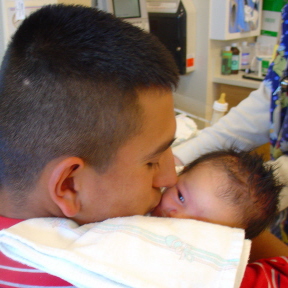« did you enjoy your chicken salad, mr. tancredo? | Main | desperation »
April 12, 2006
the most vulnerable

Last Sunday, some friends and I were talking about the forced Mexican repatriation in 1930. The response of one father surprised me. He said, "If they've deported U.S. citizens in the past, they could do it again. We should send copies of our children's birth certificates to my mother in Mexico."
Unfortunately, fairly recent events demonstrate that it is more likely that parents would be deported and the children left behind. In a raid on July 26, 2005 in Arkadelphia, AK, nearly 100 children had one or both parents suddenly deported -- some children went for days without knowing what had happened. In another story from 2004, Virginia Feliz was left behind when her mother was deported in April of the previous year. While this is one of the risks that undocumented immigrants live with every day, few prepare a plan, thus leaving the children vulnerable.
As churches and individuals, we need to acknowledge that parents place their families at risk when living here as undocumented immigrants. In the case of deportation, they need to have a plan in place -- so that they are not hastily making arrangements for their children or letting that task fall to Social Services. They also need to be prepared to tell the truth gently to their children in the case of deportation proceedings -- not a "white lie" like Virginia's parents did. Since I could find nothing online that addresses this situation, I've come up with a few steps(mostly advice all parents should follow even if deportation isn't a risk):
1. All parents should have local emergency contacts. This contact should be extremely trustworthy and should be a legal resident or U.S. citizen. Be sure your children's schools and daycare providers have this person's contact information -- and update that information as phone numbers and addresses change.
2. The emergency contact should have documented authorization to seek medical attention for the children and to keep the children in his/her custody until arrangements can be made to relocate the children with the parent or with long-term guardians. Both the emergency contact and long-term guardian(s) should have notarized copies of a form authorizing Temporary Guardianship of a Minor Child. (Click here for a sample form found on the internet).
3. The emergency contact should have complete information on how to contact long-term guardians (as this could be a family member who lives in another state).
4. The emergency contact should have a spare key to the home and know where to find important documents: birth certificates, social security cards; passports; insurance cards; vaccination records; doctor's information; and contact information for family/parents in the home country.
5. Parents may wish to prepare other items such as letters, pictures, recordings, and other items that would bring comfort in case of separation.
6. Conversations regarding a worst-case-scenario should not take place in the children's presence.
7. Think through how to tell the children in a gentle, but truthful way about the situation.
Remember that the reasons for immigration are just as complex as the solutions. Until good solutions are in place, we need to encourage parents to take proactive precautions to provide the best protection for their little ones.
If anyone comes across any helpful information or has additional advice, please email me or post it as a comment.
Posted by almamia at April 12, 2006 12:11 PM